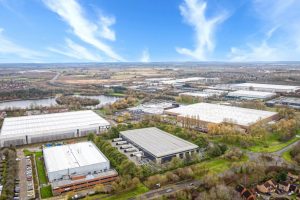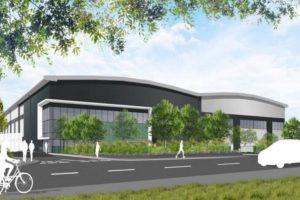The future of the forklift
HSS Editor Simon Duddy speaks to forklift manufacturers to ask what the future holds for this industry workhorse.
It is never easy to gaze into the crystal ball and predict what could happen in the future. But HSS asks key lift truck manufacturers to put their thinking caps on and tell us what they see in the future of the hardworking heart and soul of the logistics industry – the forklift.
Bendi MD Simon Brown
The logistics industry is about to undergo unbelievable change due to a principle known as The Crowd – essentially using location technology on mobile devices to make deliveries more efficient and cut out wasted miles.
You’d need a crystal ball to get a definitive answer on how that will impact forklift development but we’re already seeing order picking increasing at an exponential rate and that will continue. There are, and will be in the future, fewer full pallet loads to be handled, and more fractional pallet loads.
We’ve been building order picking trucks for many years, and we’re on the cusp of a new development, a narrow aisle counterbalance (we will call it the NAC) which will do both jobs and add a lot of value.
Combilift MD Martin McVicar
Manufacturers will continue to exploit the latest advances in fuel, power and engine technology to make lift trucks more energy efficient and wherever possible more environmentally friendly. Focus will also be on design and ergonomics to ensure that equipment is user friendly, easy to operate and that the driver workstation is a very safe and comfortable environment.
However, over sophisticated technology for the sake of it is not the way forward. Forklifts are designed to be robust workhorses, and incorporating too many intricate and sensitive systems and components can be counterproductive as this impacts on reliability, increases the risk of downtime and necessitates more complicated and costly service and maintenance.
Doosan Industrial Vehicle UK, director & general manager, Tim Waples
Doosan won a prestigious Red Dot design award for its Intelligent Concept Forklift. This included a cabin elevation and tilting function to provide a better view of the work area, and augmented reality computer technology to increase driver awareness, to give just two examples. In addition, the technology and engineering capability for folding forks are already with us, as are cameras and sensors mounted on forks and masts.
I believe such innovations will make it onto future models but the market will dictate this ultimately. Like all features, we need to demonstrate the benefits to prove the changes are worthwhile.
A great example of how Doosan’s innovative design makes it onto the production line is the new G2 diesel forklift engine, which complies with the latest emissions legislation while removing the need for a diesel particulate filter.
Flexi Narrow Aisle sales and marketing director John Maguire
We are likely to see changes in the type of trucks specified for different applications. For example, the man-up turret truck, which has been a feature of warehouse operations for nearly four decades, will, I believe, start to be seen by many as an inefficient and costly technology. The move away is being driven, in part, by the development of modern CCTV systems capable of giving the operator a high definition view of his forks and the load at any height – something that people could only have dreamed of as recently as three years ago. For example, the Flexi HiMAX allows pallet loads to be stacked to over 14 metres high and employs a high definition LCD CCTV system and laser height selector.
Jungheinrich UK sales director Jonathan Morris
WMS, on-truck data capture systems, RFID-based warehouse navigation systems and forklift truck personnel protection systems will be increasingly used to deliver lift truck operational efficiencies. However, truck manufacturers will have to take on the role of ‘system suppliers’ if the potential benefits of these integrated solutions are to be fully realised.
It is essential that the integration of the technology is carefully carried out and deliver a robust solution from the actual truck manufacturer. Simply ‘bolting’ on lots of additional equipment will not guarantee the overall benefits and improved efficiencies the technology can bring.
Linde Material Handling (UK), sales and marketing director, Andrew Daly
Ultimately, when looking at the future for the forklift, Linde is driven by customer needs. Our focus is to, for example, develop technological innovations that will improve operator ergonomics to deliver higher productivity levels.
We have already demonstrated with our new EVO series our lead in fuel efficiency and we will continue to develop innovative ideas through future fuel alternatives – we are field testing fuel cell industrial trucks at BMW.
Fleet management systems will help make customer operations more efficient in the future, and intelligent use of this data will ensure we deliver an economic solution.
While we can make generalisations about what the “truck of the future” may look like, we must recognise that every customer will have their own bespoke requirements. A “one size fits all” approach doesn’t work, it is important to adapt to the competitive environment we trade in today in order to succeed in the future.
Mitsubishi Forklifts UK general manager Mike Jones
Overhead costs – most notably fuel – will remain high. For most users, these bills now far outweigh a fork truck’s initial purchase or rental price, so smart buyers are taking more notice of running costs across the whole contract. This trend will only increase, so I expect future fork lift truck innovations to focus very much on efficiency.
The engine on our new generation Grendia cuts fuel consumption by about 40% compared to some competitors.
Nissan Forklift general manager Derek Robson
The market is strengthening and all economic indicators point to the UK growing further in 2014. Therefore the expectation is that the materials handling market will expand and sales will increase. When purchasing equipment a buyer should look for a high quality product.
Localisation is a key pillar of Unicarriers Corporation (the parent company of Nissan Forklift) so users can expect products built built in Europe for the European market.
When considering rental or purchase driver input is essential. A satisfied operator working in an ergonomic and safe truck almost always increases productivity and reduces damage.
Seegrid chief growth officer Michael Hasco
Vision-guidance will be important in the future of materials handling, and is changing the way automation appears today. Companies will want to invest in innovative technology that will reduce the cost per move and provide a quicker ROI. We see companies looking for affordable, flexible solutions they can easily and safely integrate into facilities as a replacement to rigid, traditional AGVs. Seegrid will soon bring the GWS16 walkie stacker to the European market.
Toyota Material Handling UK, sales and marketing director, Tony Wallis
As the economy changes and businesses set more challenging sustainability targets, Toyota is continuing to adapt to customer needs. One area that Toyota is continuing to invest in is alternative power technologies.
We now offer lithium-ion powered warehouse trucks to all our customers but primarily look to work with those who will get the largest business benefits from this type of power source.
Alongside lithium-ion, we are also looking into finding a sustainable, productive solution to both fuel cells and hybrid technology. We are trialling fuel cells in the USA and Hybrid technology in Japan.
UniCarriers Europe group marketing manager Tobias Laxa
The requirements for forklifts in the future will be defined by changing consumption patterns rather than by production strategies. More and more people are consuming more and more articles. Traditional shopping is rapidly being replaced by e-shopping, and order picking directly for consumers is increasing daily.
For short and flexible delivery times, distribution must be executed close to the consumer and cannot be outsourced to low-cost regions. The cost of labor is also increasing. As a result, logistics will be a higher percentage of what the consumer pays for a product, and this will put pressure on the total cost of operation of any distribution chain. That’s why in forklift truck operations the efficiency and performance of the machine will need to improve continuously in order to obtain maximum productivity from every working hour. The need for efficiency will also lead to a greater specialisation of warehouse trucks for a particular application.
Yale Europe Materials Handling, product strategy manager – counterbalance, Matthew Allen
Continued improvements in ergonomics and comfort are paramount. Yale will accomplish this by continuing to pay attention to the ergonomic design of the operator’s compartment and providing the most intuitive controls.
2014 will also see increasing environmental pressure and legislation. Undoubtedly we will see an increasing number of companies convert their fleet to electric power. The capacity at which equivalent productivity can be achieved with Diesel/LPG and electric counterbalanced forklifts continues to creep upwards towards 5.0T, particularly in intensive applications where until recently users were unwilling to change the battery during the shift.






